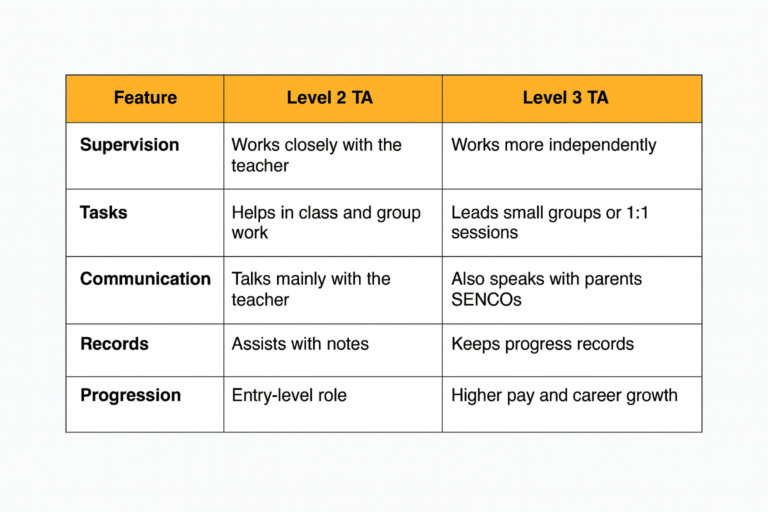So, what is a teaching assistant level 3? It’s someone who gives skilled classroom support to both teachers and pupils. They guide small groups, help children one-to-one, and make sure every lesson runs smoothly. Their job is to keep learning fun, focused, and full of progress.
In this guide, you’ll discover what Level 3 TAs do each day, how to get qualified, and where you can work. We’ll also talk about study routes, placements, pay, and how you can move up to become a Higher Level Teaching Assistant (HLTA).
Being a Level 3 Teaching Assistant means making a real difference in children’s lives. Every day brings new smiles, challenges, and rewarding moments that make the job so meaningful.
What Is a Teaching Assistant Level 3?
Level 3 Teaching Assistants support teachers and pupils in the classroom. With more experience than Level 2s, they work independently, guide small groups, and offer one-to-one help when needed.
In the teaching assistant levels UK system, Level 3 is higher than Level 2 but lower than a Higher Level Teaching Assistant (HLTA). Level 2 TAs follow the teacher’s lead. Level 3 TAs can lead short lessons or small activities.
The difference between a Level 2 and vs Level 3 Teaching Assistant is responsibility. Level 3 TAs have stronger skills and more confidence. They help make learning calm, fun, and easy for every child.
What Does a Level 3 Teaching Assistant Do Day to Day?
A Level 3 Teaching Assistant has many important jobs in the classroom. They help pupils learn, feel confident, and stay focused every day. The role is busy but full of purpose and joy.
Here are some of the main Level 3 Teaching Assistant duties:
- Support small group lessons in reading, writing, or maths.
- Give one-to-one help to pupils who need extra care.
- Lead short TA interventions planned by the teacher.
- Remind pupils about good behaviour and help them stay calm.
- Share quick feedback with the teacher about progress.
- Keep learning records and update classroom displays.
- Stay alert to safeguarding and report any concerns.
- Help the classroom stay clean, organised, and friendly.
Every day is different. You might help a child read for the first time or see their confidence grow. These moments make the job truly special.
What Qualifications Do You Need for Level 3 TA Roles?
To work as a Level 3 Teaching Assistant, you need some basic education and training. Schools want people who are kind, patient, and enjoy helping children learn.
Here’s what you usually need:
- GCSE English and Maths (grades 9–4/C or the same level).
- A Level 3 Teaching Assistant course, like the Supporting Teaching and Learning (STL) Certificate or Diploma.
- You can also do a Level 3 TA apprenticeship and learn while you work.
- Choose a course from an Ofqual-approved body such as NCFE, CACHE, or City & Guilds.
These teaching assistant qualifications UK help you learn how to support children, follow rules, and work well with teachers. When you finish your NCFE CACHE Level 3 course, you’ll be ready to start a rewarding career where you help children grow and succeed every day.
Do Level 3 Teaching Assistant Courses Require a Placement?
Yes, most Level 3 Teaching Assistant courses need a school placement. This is because you must show your skills in a real classroom. You’ll need to work with pupils, support lessons, and help teachers during your placement.
The Level 3 Teaching Assistant placement can be in a primary, secondary, or special school. You can do it through paid work or as a volunteer. The main goal is to get hands-on experience and prove that you can support children safely and effectively.
During your TA work placement, you’ll have a mentor who guides you and checks your progress. You’ll also collect evidence for your Supporting Teaching and Learning Level 3 qualification.
If you don’t already work in a school, try contacting local schools or multi-academy trusts (MATs). They often welcome trainees who are eager to learn and help in the classroom. It’s a great way to gain confidence, skills, and experience while studying.
How Long Does a Level 3 TA Course Take in 2025?
The time it takes to finish a Level 3 Teaching Assistant course can vary. It depends on how you study and how much time you can give each week.
Most courses take a few months if you study part-time. Many learners choose to study online, which gives them more freedom to learn at their own pace. These online teaching assistant courses UK are flexible, so you can fit them around work or family life.
If you choose a Level 3 TA apprenticeship, it usually takes about a year or a little longer. You’ll be learning while working in a school, which gives you great hands-on experience.
Overall, the length of your course depends on your training provider and your school hours. Some people finish quickly, while others take a bit more time to build confidence. What matters most is learning the skills that help children learn and grow every day.
How Much Do Level 3 Teaching Assistants Earn?
A Level 3 Teaching Assistant’s salary can change depending on where you work in the UK. Most schools use local council or academy trust pay scales.
Level 3 Teaching Assistants in the UK typically earn £24,000–£27,000 a year full-time, or £13,000–£15,000 pro rata term-time. Usually, you work term-time only. This means you get paid for the school weeks, not the holidays. So, your yearly pay may look smaller, but your hourly rate is fair. Level 3 TAs earn more than new TAs because they take on more work and responsibility. In some areas, like London, you can also get extra pay.
To know your exact pay, check the job advert. Look for the pay grade or SCP number and match it with your local council’s pay table. Most teaching assistant level 3 hourly rates are between £11 and £14. The job may not make you rich, but it gives real joy. You help children learn and grow every day — and that’s a reward in itself.
What Skills Help You Succeed as a Level 3 TA?
Working as a Level 3 TA is about more than helping in class — it’s about people, patience, and purpose. To truly succeed, you need skills that blend heart with hands-on support.
Let’s talk about what really helps you shine:
- Good communication: You talk and listen every day — to pupils, teachers, and parents. A calm, clear voice builds trust and confidence.
- Behaviour support: Sometimes children need gentle guidance. A steady tone or warm smile can turn a tough moment around.
- SEN awareness: Every child learns differently. When you understand special educational needs, you can give each one the right kind of help.
- Organisation: Lessons flow better when you’re ready. From preparing worksheets to keeping records, small details make a big difference.
- Initiative: Great TAs don’t just wait to be told. You notice what needs doing and step in before anyone even asks.
- Teamwork: You’re part of something bigger — a team that includes teachers, SENCOs, and therapists. When everyone works together, children grow in confidence and happiness.
In the end, your skills make classrooms calmer, learning easier, and children’s days brighter. That’s what being a great Level 3 TA is all about.
Level 2 vs Level 3: What’s the Difference?
If you’re thinking about moving up in your teaching assistant career, it helps to understand the difference between Level 2 and Level 3 TAs. Both play key roles in helping pupils learn, but the level of responsibility and independence changes a lot.
Here’s a clear breakdown:

In short, Level 2 is about learning the ropes and offering steady support. Level 3 is about taking charge, leading learning activities, and making a real impact in the classroom.
Both levels matter, but moving up to Level 3 can open new doors, build your confidence, and help you shape pupils’ learning more directly.
Can a Level 3 TA Lead Lessons?
Yes, a Level 3 Teaching Assistant can lead lessons, but only under the teacher’s direction. You may guide small groups in reading or maths. You can also help pupils practise skills and stay focused.
Level 3 TAs work more independently than Level 2 TAs. You might plan short activities or check how pupils are doing. You also give quick feedback to the teacher and help manage behaviour in class.
However, to lead full lessons often, you need Higher Level Teaching Assistant (HLTA) status. This training helps you plan and teach lessons on your own.
In short, Level 3 TAs can lead parts of lessons and support learning every day. But if you want to teach full lessons, HLTA is your next step.
Do Level 3 TAs Work with SEN Pupils?
Yes, they do. Level 3 Teaching Assistants often work with Special Educational Needs (SEN) pupils. This role is very meaningful and makes a big difference in children’s lives.
Here’s what you may do:
- Give one-to-one support to children who need extra help.
- Adapt lessons or resources so tasks are easier to understand.
- Use visuals or communication aids to support learning.
- Record progress through IEPs (Individual Education Plans) or EHCPs (Education, Health and Care Plans).
- Work with teachers, the SENCO, and therapists to meet each child’s needs.
- Encourage confidence and inclusion in class activities.
Every small step matters. When you support SEN pupils, you help them learn, grow, and feel valued every day.
How Do You Progress from Level 3 to HLTA?
Moving from Level 3 Teaching Assistant to Higher Level Teaching Assistant (HLTA) is a big step forward. It helps you take on more responsibility and grow in your role.
Here’s how you can do it:
- Make a portfolio that shows how you help pupils learn.
- Get good references from teachers or your manager.
- Check your skills against the HLTA standards.
- Finish an HLTA course and assessment to show your abilities.
- Apply for HLTA jobs when you feel ready.
Each step helps you build confidence and open new career doors. It’s a great way to keep learning and make a bigger difference in school.
How to Find Level 3 Teaching Assistant Jobs
Finding Level 3 Teaching Assistant jobs can be easy when you know where to look. Here are some simple ways to start your search:
Check local school websites
- Go to the “Careers” or “Vacancies” page.
- Many schools post jobs there first.
Look at Multi-Academy Trust (MAT) websites
- MATs run several schools and list all their MAT jobs in education together.
- You can search by role or location.
Visit your local council’s job portal
- Councils list teaching assistant jobs UK in local schools.
- These sites are trusted and often updated.
Use education job boards
- Try TES Jobs, Eteach, or Teaching Vacancies (GOV.UK).
- They post new jobs every day.
When you apply, make sure your CV stands out:
- Write about your Level 3 qualification.
- Add your placement hours and any SEN support work.
- Include skills in safeguarding or helping with small groups.
- Give short examples of how you helped pupils learn.
Finally, show your warmth and passion in your CV or cover letter. Schools love people who care about children and enjoy helping them grow and succeed.
FAQs: Level 3 Teaching Assistant
- What is the role of an A-Level 3 teaching assistant?
A Level 3 Teaching Assistant helps the teacher in class. The role includes supporting small groups of pupils and helping children with special needs.
- Can I be a TA with no experience?
Yes, you can be a Teaching Assistant with no experience. Schools value kindness, patience, and a real interest in helping children learn.
- What does a level 3 TA get paid?
A Level 3 Teaching Assistant can earn up to £25,000 a year. Those with extra skills or SEN duties may earn more. HLTAs usually make between £22,500 and £29,000, based on experience.
- Is a teaching assistant a good job?
Yes, being a teaching assistant is a good job if you enjoy helping children learn and want a good work-life balance. It’s less ideal if you’re looking for high pay or an office job.
- Is becoming a TA hard?
Becoming a TA can be challenging at first. You may face tough days or make small mistakes, but you learn and improve with time.
Final Thoughts: Is Level 3 the Right Step for You?
If you want more freedom in class and to take on bigger tasks, Level 3 is a great next move. It helps you lead small group work and plan learning activities with more confidence.
So, is Level 3 Teaching Assistant worth it? Yes. It’s the best step if you want to grow, gain independence, and work towards becoming a Higher Level Teaching Assistant (HLTA). Your next move could be simple. You might take a short SEN or behaviour course, talk to a local school or MAT about placements, or compare Level 3 TA providers.
Each step brings you closer to becoming a Level 3 TA and building a strong teaching assistant career progression.




